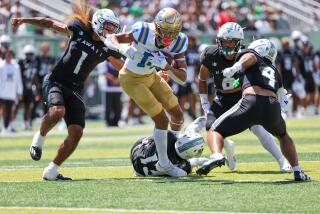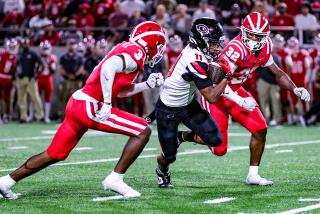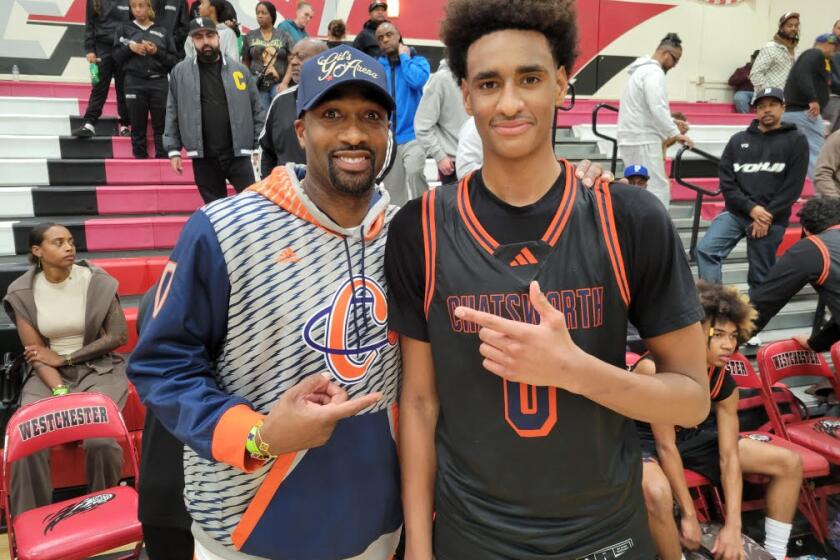He Goes an Extra Step for Prospects : Recruiting: Laguna Hills sports consultant advises high school players based on his experiences with the often-confusing process.
Jim Walsh remembers all the attention. He was a blue-chipper. One who couldn’t miss.
Every college wanted him. The recruiting letters and the phone calls poured into his home almost nonstop during his junior year at San Mateo Serra High School.
Then, one day, it did stop.
Walsh, a former Stanford assistant coach and now a sports consultant in Laguna Hills, watched an ankle injury bring an end to his hopes 17 years ago, during his senior year at Serra.
He knows the potential rewards of the recruiting process--a scholarship, an education, perhaps an NFL career and then a coaching position.
And he knows its pain--missing a shot at a major Division I school and watching recruiters bypass him because of injury.
Walsh tells those stories. He has told them to Chicago Bears’ running back Brad Muster, to former Tustin High baseball player Shawn Green--now with the Blue Jays--and to his other clients with A STEP Beyond, his sports consulting business.
And now he tells them to Los Alamitos High quarterback Tim Carey, one of the most highly recruited players in the nation.
Walsh has worked with Carey since last spring on his passing technique, strength and conditioning, nutrition, balance and mental approach to the game.
Along with Carey’s parents and Los Alamitos Coach John Barnes, Walsh has helped prepare the quarterback to handle the pressures of the recruiting process.
“I started off on the same road as Tim,” Walsh said. “All the letters, all the attention.
“Then my ankle went out my senior year. I couldn’t deal with it. I felt isolated.”
A fullback and linebacker, Walsh bench-pressed 380 pounds and ran 100 yards in 10 seconds flat.
California and USC wanted him. Notre Dame’s Ara Parseghian was the first coach to send him a recruiting letter.
But Walsh damaged ligaments in his ankle during a practice just before his senior year. Most of the recruiting interest stopped.
Walsh said he and his parents weren’t prepared to handle the process, or what to do when the interest stopped.
“My football coach didn’t send game films to colleges,” he said. “I didn’t get to make visits. My parents didn’t know what was going on.
“My heart was broken. I made a vow to myself, that I knew I was the best fullback in America. I had a point to prove.”
Walsh did land a scholarship--to UC Riverside, where his cousin and brother also played. He played his freshman year with a cracked pelvis bone. At the end of the season, Riverside dropped its program.
He sat out the following year with three ruptured disks in his back, then played one season at the College of San Mateo.
Walsh blames his conditioning for the injuries.
“I listened to people who were telling me, ‘Never quit; get stronger,’ ” he said. “I could bench press 460 pounds, squat 660 and run a 4.5 40. But it didn’t make me a better player. It made me a strong guy who could run. And it blew my body apart.”
Still hobbled with injuries, he walked on at San Jose State in 1978. He blew out his left knee, which required reconstructive surgery.
“By then, I was considered damaged goods,” he said. “I was one of 13 running backs there, and I was coming off knee surgery. I figured I was out.”
But he earned a scholarship as a senior and teamed with quarterback Ed Luther and tailback Jewerl Thomas to lead the Spartans to the Pacific Coast Athletic Assn. championship.
Walsh led the team in receptions (45) and average yards per carry (5.6).
His 200 yards rushing against Santa Clara was the ninth-best single-game effort in school history. He was an all-conference selection and voted the team’s most inspirational player. He graduated with a history degree.
Then came the NFL.
Walsh landed with Buffalo as a free agent in 1980 but was cut during training camp. He was claimed on waivers by Seattle and spent the 1980-81 season with the Seahawks.
His playing career ended in 1981, when he snapped a muscle in his upper leg and suffered abdominal injuries. He was running a pass route when it happened.
Walsh spent the next three seasons coaching the running backs at San Jose State under Jack Elway. When Elway went to Stanford, Walsh went with him.
Walsh’s recruiting duties included Orange County as well as overseeing the school’s national recruits.
He visited more than 250 athletes’ homes during those five years, and learned that parents, players and even coaches and scouts have misconceptions about the recruiting process.
He said players are evaluated improperly, recruited for the wrong positions, told that they can’t compete at the Division I level when they might actually have the potential.
“I can remember there wasn’t one kid who came in with an accurate 40-yard dash time and was prepared,” he said. “Everyone can be lied to. Everyone can be misevaluated. I know the pitfalls of the process, and I know that athletes can get through the peaks and valleys.”
Walsh, 35, left Stanford in 1987 to start his consulting business. In the past five years, he has worked with more than 250 athletes on a one-to-one basis, and more than 2,500 at clinics.
His fee for six weekly hour-long visits is $500. Diagnostic tests of blood, urine and hair samples to determine nutritional deficiencies cost extra.
He creates a specialized training regimen--with an emphasis on running techniques--for each client, taking into account body type and sport. Strength and conditioning programs are designed to meet the physical requirements of each athlete.
He also advises some of his athletes competing for scholarships, teaching them to ask recruiters questions about the school, about scheduling visits. He also gets the players’ parents involved.
“Parents bring a certain balance and maturity to the recruiting process,” he said. “It’s up to them to help establish the line of communication between the university and the player. An 18-year-old kid has a hard time saying no to a college coach.”
As for Walsh, he enjoys watching the recruiting process now as an outsider, remembering both what it was--and what it could have been.
“It was no bed of roses for me,” he said. “I never got a degree from Harvard, but I got one from the school of hard knocks.”
More to Read
Get our high school sports newsletter
Prep Rally is devoted to the SoCal high school sports experience, bringing you scores, stories and a behind-the-scenes look at what makes prep sports so popular.
You may occasionally receive promotional content from the Los Angeles Times.






